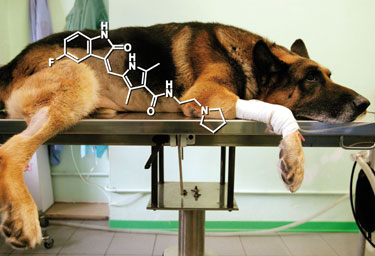If you are a conscientious dog owner then you know the areas of focus for dog wellness, including exercise, diet, health and nutrition. Are you also aware of the pet killer medicines that are probably in your home right now and perhaps not put away safely?
When it comes to our children it goes without saying how very careful, maybe even paranoid we are about medicines of any kind left lying around the house. Are you as careful with your dog?
Each year the APCC (Animal Poison Control Center) receives around 90,000 calls from pet owners whose dog or cat has come in contact with human medicine. Some medicines will simply cause a tummy ache while others are deadly, and if you are able to save your pet, you can bet that your vet bill will be a whopping one! Not that money matters at a time of desperation to save your pet but avoiding a scenario such as this is the best and safest way to go for you and your pet.
Dog wellness for pet owners means being aware of dog dangers all around and that includes any areas of human life that could be dangerous or potentially fatal for your dog.
Many people have an understanding that dogs can take quite a few human medications for help with common simple illnesses like tummy ache and fever. This is not true for a majority of dog illnesses but only for a small minority and pet owners should always check with their vet first.
Should your dog or pet ingest any of the following medications, time is not on your side and you need to seek medical assistance immediately.
There are several common over the counter prescription and non prescription medications that are highly toxic to your dog or cat. Ibuprofen and Acetaminophen.
10 Deadly Pet Killer Medicines
The following are the top 10 offenders when it comes to pet poisonings.
1. Non-steroidal anti-inflammatory drugs (NSAIDS)
Medications with NSAIDS
- Advil
- Medipren
- Anaprox
- Naprelan
- Nuprin
- Motrin
- Naprosyn
- Aleve
NSAIDs metabolize slowly, which increases the likelihood of toxic level build up.
Symptoms of pet poisoning
- Digestive upset
- Bloody stool
- Increased thirst
- Frequency of urination
- Staggering and seizures
Ibuprofen and Naproxen are the most frequent causes of pet poisonings, particularly dogs and cats.
Your veterinarian may prescribe this type of medication for your dog or cat, but the dose will be very carefully adjusted for your animal’s size and health requirements. This adjustment can only be determined by a medical professional specializing in animal health care. In other words a veterinarian.
These common human medicines are found in most homes on kitchen counter, night stands, bathrooms and are usually easily reachable by any dog or cat. Even dropping one on the floor without realizing it can prove to be a fatal disaster for your dog or cat. If you drop one on the floor do hesitate in picking it up immediately, as often doggies come running at the idea of people falling on the ground, especially if they are coated with sugar which is often the case with some of these pet killer medications.
Even a small dose can make your dog or cat ill. Cats can suffer kidney damage and any pet can develop ulcers of the digestive tract.
2. Acetaminophen
This is another extremely common painkiller that can mean serious danger to pets.
Medications with Acetaminophen
- Tylenol
- Paracetamol
- Panadol
Excedrin and several sinus and cold preparations, also contain acetaminophen.
In cats this drug causes the liver to break down, damage red blood cells and make it difficult for the cat to use oxygen. It only takes two tablets for fatality.
In dogs the cause is liver damage with the higher the dose the more likelihood red blood cells are damaged beyond repair. Obviously knowing this it become imperative that dog owners are fully aware of dog wellness areas such as pet killer medicines in order to shield their dog from fatal consequences.
Symptoms of pet poisoning
-Lethargy
-Trouble breathing
-Dark-colored urine
-Diarrhea and vomiting.
3. Pseudoephedrine
Pseudoephedrine is found in a wide range of cold and sinus medications and has stimulant behavior qualities.
Medications with Pseudoephedrine
-Sudafed
-Tylenol Cold
-Entex
-Theraflu
-Comtrex
-Sinarest
-Dristan Cold
-Triaminicin
-Tavist
-Drixoral
-Contac
-Nyquil
Keep in mind there are dozens of over-the-counter and prescription drugs which contain Pseudoephedrine.
Symptoms of Poisoning
In both cats and dogs
-Rise in blood pressure
-Heart rate and body temperature
-Seizures.
-Behavioral symptoms such as nervousness and hyperactivity.
4. Antidepressants
Symptoms of poisoning
-Listlessness
-Vomiting
-Serotonin Syndrome
This syndrome causes agitation, disorientation, elevated heart rate, blood pressure and body temperature, tremors and seizures.
5. Diabetes medications
Brand names of Glipizide and Glyburide
-Glucotrol
-Glynase
-Glycron
-Micronase
-DiaBeta
-Glucovance
Symptoms of Poisoning
In Dog and cat
-Drop in blood sugar levels causing disorientation, lack of coordination and seizures.
6. Methylphenidate (for ADHD)
This drugs is a stimulate in dogs and cats and other pets.
Brand Names
-Ritalin
-Concerta
-Daytrana
Symptoms of Poisoning
- Elevated body temperature, heart rate and blood pressure
-Seizures
7. Vitamin D derivatives
Vitamin D derivatives such as calcitriol and calcipotriene are used to treat human conditions such as psoriasis, thyroid problems, and osteoporosis. In your dog or cat this drug can cause fatal blood calcium levels to rise.
Symptoms of Poisoning
-Loss of appetite
-Vomiting
-Increased urination and excessive thirst (due to kidney failure)
8. Fluorouracil topical
Used externally to treat minor skin cancers prove deadly to your dog.
Brand names
-Efudex
-Carac
-Fluroplex
Symptoms of poisoning
-Severe vomiting
-Cardiac Arrest
-Seizures
9. Isoniazid
Isoniazid, brand name Nydrazid, is a drug used to prevent and treat tuberculosis in humans.
Dogs, in particular can not metabolize this medication causing fatal seizures.
10. Baclofen
This drug is a muscle relaxant and can damage your dog’s or cat’s central nervous system.
Brand names include
- Co Baclofen
- Kemstro
- Lioresal
- Liotec
- Nu-Baclo
Symptoms of Poisoning
- Disorientation
- Vocalization
- Seizures
- Coma
If you even think your pet may have ingested any of the above medications call your vet, emergency clinic, or pet poison helpline immediately.
Dog wellness and pet wellness in general suggests that pet owners have good housekeeping habits by way of ensuring all dangerous products are safely out of reach of pets and this certainly includes human medications. Make sure to house all your medications properly in sealed containers, and be conscientious not to leave them lying around. This remains true even of pet medicines, as they too can be deadly if overdosed.
Subscribe to:
Post Comments (Atom)





















































Thank you so much for the information. This post is very useful. Feel free to surf to my site ... Pet care supplies online
ReplyDelete